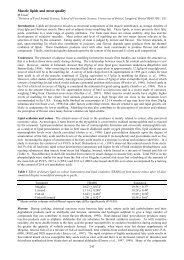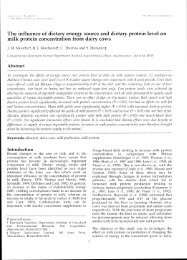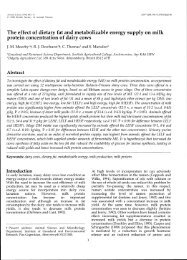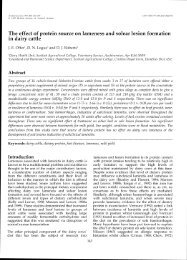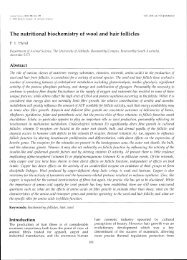PROGRAMME - British Society of Animal Science
PROGRAMME - British Society of Animal Science
PROGRAMME - British Society of Animal Science
Create successful ePaper yourself
Turn your PDF publications into a flip-book with our unique Google optimized e-Paper software.
209<br />
The <strong>British</strong> Pig Industry and the impact <strong>of</strong> consumer opinions<br />
P. Toplis<br />
Technical Director, Primary Diets, Melmerby Industrial Estate, Melmerby, Ripon, North Yorkshire, HG4 5HP England.<br />
Email: paul.toplis@primarydiets.com<br />
Neither the consumer nor the Pig Industry is defined within an exact science. Consumers and their opinions are described in an<br />
enormous variety <strong>of</strong> ways including High Rise Hardship through Educated Urbanites to Prudent Pensioners, Settled Suburbia,<br />
and Affluent Greys and so on. The list seems endless! The Agricultural Census wins few prizes for accuracy but according to<br />
the latest census there are around 4.5 million pigs in the UK with over 425 thousand breeding females. Surprisingly both<br />
breeding and fattening herd sizes continue to fall (down to 148 and 783 respectively). The greatest density <strong>of</strong> pigs is in Suffolk<br />
but the greatest number is in East Yorkshire. In England around 40 percent <strong>of</strong> commercial breeding pigs are outdoors utilising<br />
around 9000 hectares. Most indoor breeding pigs are kept on totally or partially slatted floors in farrowing accommodation<br />
whilst the remainder <strong>of</strong> the breeding cycle is straw based. Only one fifth <strong>of</strong> outdoor bred piglets remain outdoors (7-30kg) with<br />
indoor reared piglets split evenly between straw and fully slatted accommodation. Beyond 30kg only three percent <strong>of</strong> pigs<br />
remain outdoors. The majority <strong>of</strong> indoor reared pigs beyond 30kg are on straw but relatively more finishers (above 65kg) are<br />
on slatted flooring. Across breeding units 118,000 females have Freedom Food certification with an estimated 2.7 million<br />
finished pigs covered by the scheme. Around 50,000 pigs are covered by organic certification at any one time.<br />
Abattoirs killing pigs have declined considerably with only 124 remaining in England. Four large companies with eight sites<br />
now kill three quarters <strong>of</strong> English pigs. The average number <strong>of</strong> workers per holding with pigs is 3.3 with over half <strong>of</strong> these<br />
farmers, partners, directors and spouses. Self sufficiency in pork production has fallen from 80% in 2000 to around 50% today,<br />
a fall some commentators blame on the increased costs associated with meeting consumer opinions (demands) not being<br />
recompensed by their actual buying habits.<br />
The <strong>British</strong> Pig Industry has learned to its cost that many consumers have aspirations and interests which outstrip their<br />
shopping behaviour. The <strong>British</strong> consumer has long had an interest in ethical (welfare) and environmental issues and these<br />
continue to grow (up from 81% to 86% in the last 4 years). Despite a growing awareness and interest in these issues the<br />
economic climate has a ‘gearing’ effect on how much consumers engage them during shopping. A recent survey by IGD<br />
segmented shoppers into five segments and compared their shopping behaviour to that found in a previous survey. The Ethical<br />
Evangelists, the most ethically engaged, have decreased their application to shopping choices (down from 15% to 8%), whilst<br />
the Focussed Followers (focused on several issues only) are similarly less engaged (26% down to 21%). The Aspiring<br />
Activists & Blinkered Believers, who now account for 54% <strong>of</strong> shoppers, actively support a number <strong>of</strong> ethical issues but are<br />
selective about which one(s) they apply to shopping choices. Rather than dropping their ethical standards they tend to focus on<br />
the one which concerns them most when shopping. It is this shift out <strong>of</strong> broad engagement into narrow focus at the moment <strong>of</strong><br />
purchase which has confounded pig producers until recently. Interestingly the Conscience Casuals, who are not ethically<br />
engaged, have declined (from 21% to 16%). What is clear is that ‘value’ continues to drive consumer choices at purchase but<br />
that there is increasingly a mental referencing to their ‘values’ as they seek to satisfy as many ethical and environmental<br />
concerns as possible within their financial constraints. Value and Values compete at the point <strong>of</strong> purchase and the weighting<br />
given to Values is influenced by the disposable income <strong>of</strong> the purchaser. Consumers believe they should be rewarded for<br />
embracing Values through incentives on the more ethical products.<br />
An increasing feature <strong>of</strong> the <strong>British</strong> Pig Industry is the integrated Values chain where <strong>of</strong> a specific group <strong>of</strong> farms act as a<br />
dedicated supplier for a specific retailer or brand for that retailer. While the <strong>British</strong> Pig Industry may be dominated by talk and<br />
demand for Values, many consumers still feel unable to put their aspirations into practice and purchase instead what they<br />
perceive to be best value for money. These mixed messages from consumers will continue to undermine producer confidence<br />
and continue to reinforce a commonly held producer view that their only option is to work as a fiercely independent business<br />
seeing their neighbour as a competitor.<br />
The <strong>British</strong> Pig Industry has been seriously weakened by consumer opinion influencing politicians, who naively allowed what<br />
Aspiring Activists & Blinkered Believers say rather than do to dictate our laws and government policy. Where pig producers,<br />
processors and retailers work together to satisfy the consumer demand for value and values stronger and more pr<strong>of</strong>itable<br />
supply chains are emerging. Dealing with current welfare issues raised by consumers such as tail docking, teeth<br />
clipping/grinding and nose ringing matters pr<strong>of</strong>oundly in some supply chains but not at all in others.<br />
22



